Audio production is the intricate process that can elevate a simple track into a chart-topping sensation.
It has the magic to make your beats hit harder, vocals shine brighter, and melodies resonate deeper (and longer).
Therefore, as a music producer, understanding the complexities and nuances of audio production is not just beneficial, but vital.
It’s the key to transforming your raw ideas into full-blown masterpieces 一 giving them extra depth, space, and texture.
That’s why we’ll be delving deep into the realm of audio production so you can produce professional tracks that are emotionally captivating.
In today’s article, we’ll be breaking down:
- Audio production fundamentals ✓
- The role of an audio engineer ✓
- Essential factors when learning audio production ✓
- Insights into DAWs, plug ins & other audio software ✓
- Audio recording techniques ✓
- Mixing & mastering ✓
- How to create irresistible beats ✓
- Incorporating audio effects/sound effects ✓
- The post-production process & dynamics processing ✓
- How to enhance your music production skills ✓
- Much more ✓
You’ll come away with a solid understanding of the audio production landscape.
As well as gain insight into the science behind quality recording, the art of mixing and mastering, the creativity in beat-making, and the finesse of post-production.
This way, you can produce music that not only sounds professional and impeccable but instantly captivates.
So, let’s dive in…
Table of Contents
What is Audio Production?
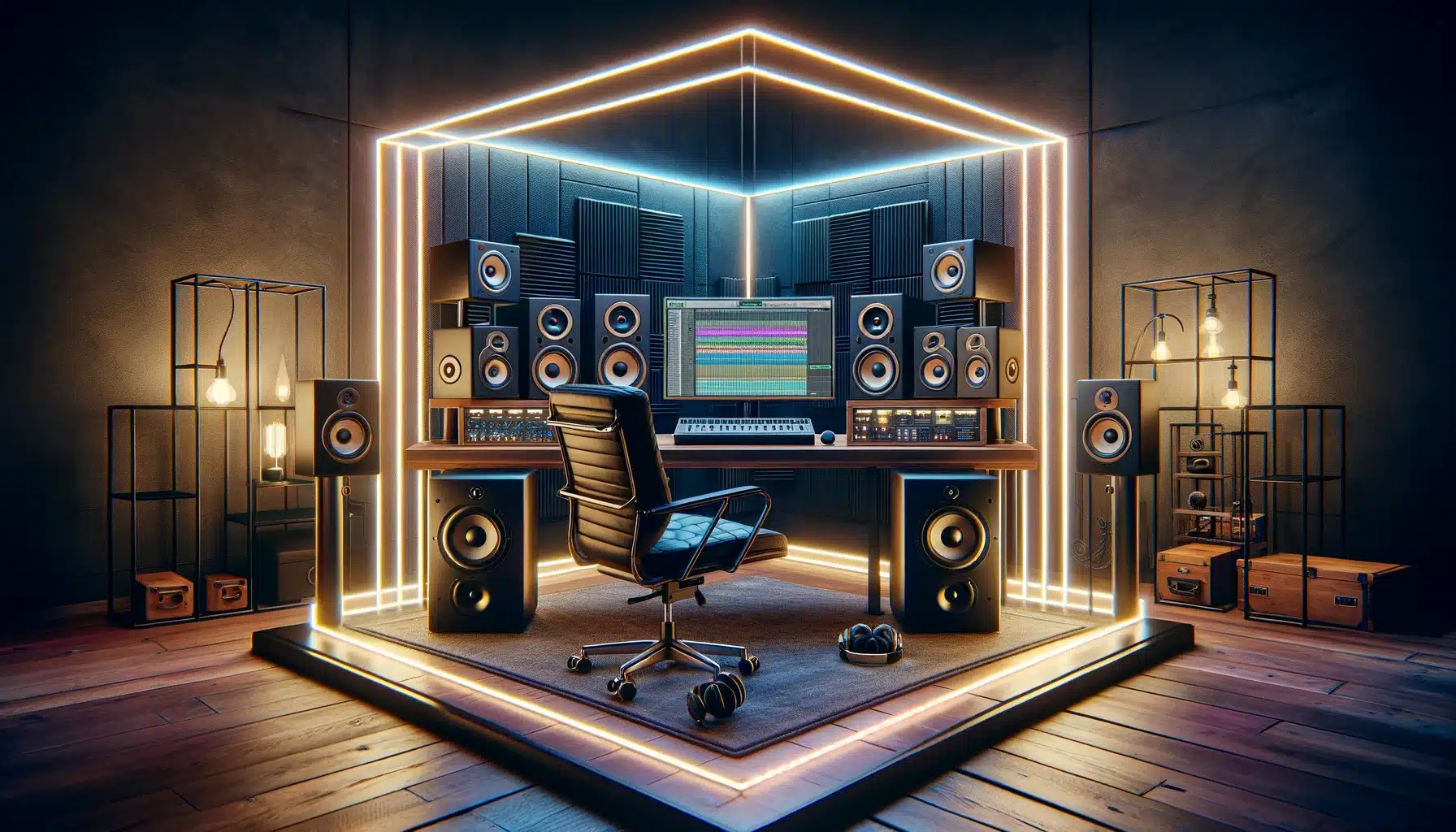
Audio production is the intricate world behind the music we create and love.
It’s a multifaceted process (seamlessly blending technology with creativity) where raw sounds are captured, manipulated, and sculpted.
At its core, audio production involves:
- Recording instruments and vocals
- Editing to remove imperfections
- Arranging various elements
- Mixing and mastering to bring out the best sonic qualities
It’s the precision behind every track, taking the raw components of melody, rhythm, harmony, and texture and blending them into a cohesive final product.
Modern-day audio production leverages advanced digital tools and audio software, known as Digital Audio Workstations (DAWs), to offer limitless possibilities in sound manipulation.
From the infectious pop hits we can’t stop humming to the atmospheric soundscapes in our favorite films, audio production plays a pivotal role.
Therefore, it’s an essential skill for any beat-maker and audio engineer looking to leave a mark in the music industry.
Why Audio Production is Key for Success As a Beat-Maker
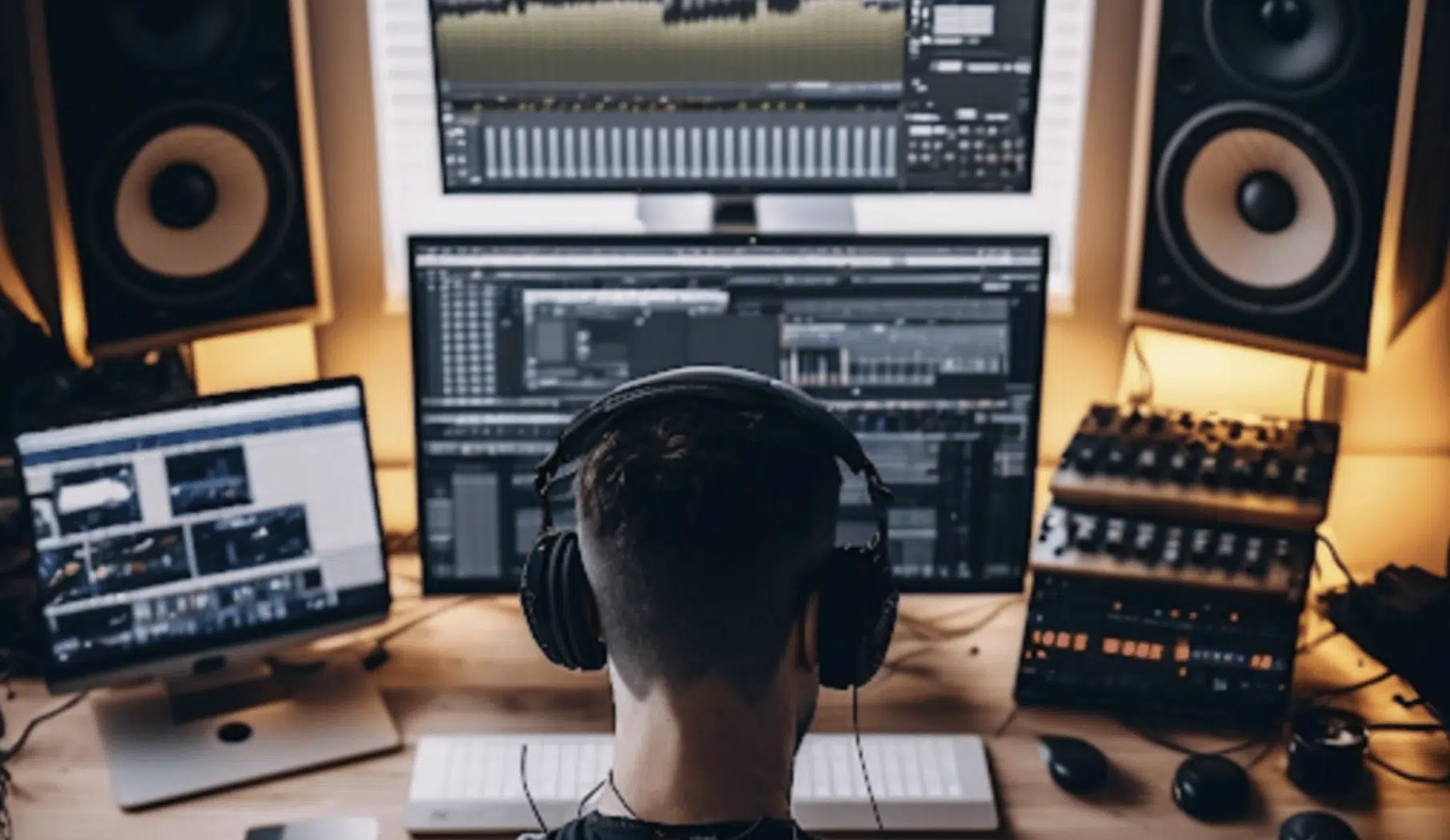
Beat-making is more than just opening up a digital audio workstation, laying down a few drum patterns and loops, and playing around with audio software.
It’s about creating an atmosphere, evoking emotions, and setting the tone for the lyrics to shine.
And the key to achieving this is a deep understanding of audio production.
With the music industry being democratized more than ever, anyone can make beats and indulge in audio production.
But what sets apart a good beat from a great one is the quality of audio production behind it and the music production skills backing it all up.
It’s the difference between a beat that sounds flat and one-dimensional versus one that feels alive, dynamic, and full-bodied.
High-quality audio production ensures that every element in a beat (from the kick and snare to the intricate hi-hats and synth lines) sits perfectly in the mix.
It allows you to:
- Layer sounds effectively
- Carve out space for vocals
- Give your beats a polished, professional touch
For beat-makers and audio producers aiming for mainstream success, audio production is non-negotiable.
Espeically if you want to blow up on SoundCloud, Spotify, or other streaming sites.
It’s the tool that will help elevate your beats and make them more shareable (and, of course, unforgettable).
Delving Into Digital Audio & Digital Audio Workstations (DAWs)
Delving deeper into the audio production world, the tools of the trade are essential.
All producers require their arsenal, and DAWs (digital audio workstations) are the weapons of choice for you to ensure all the songs you create are processed to perfection.
-
Introduction to Digital Audio: The Allure of Producing Audio
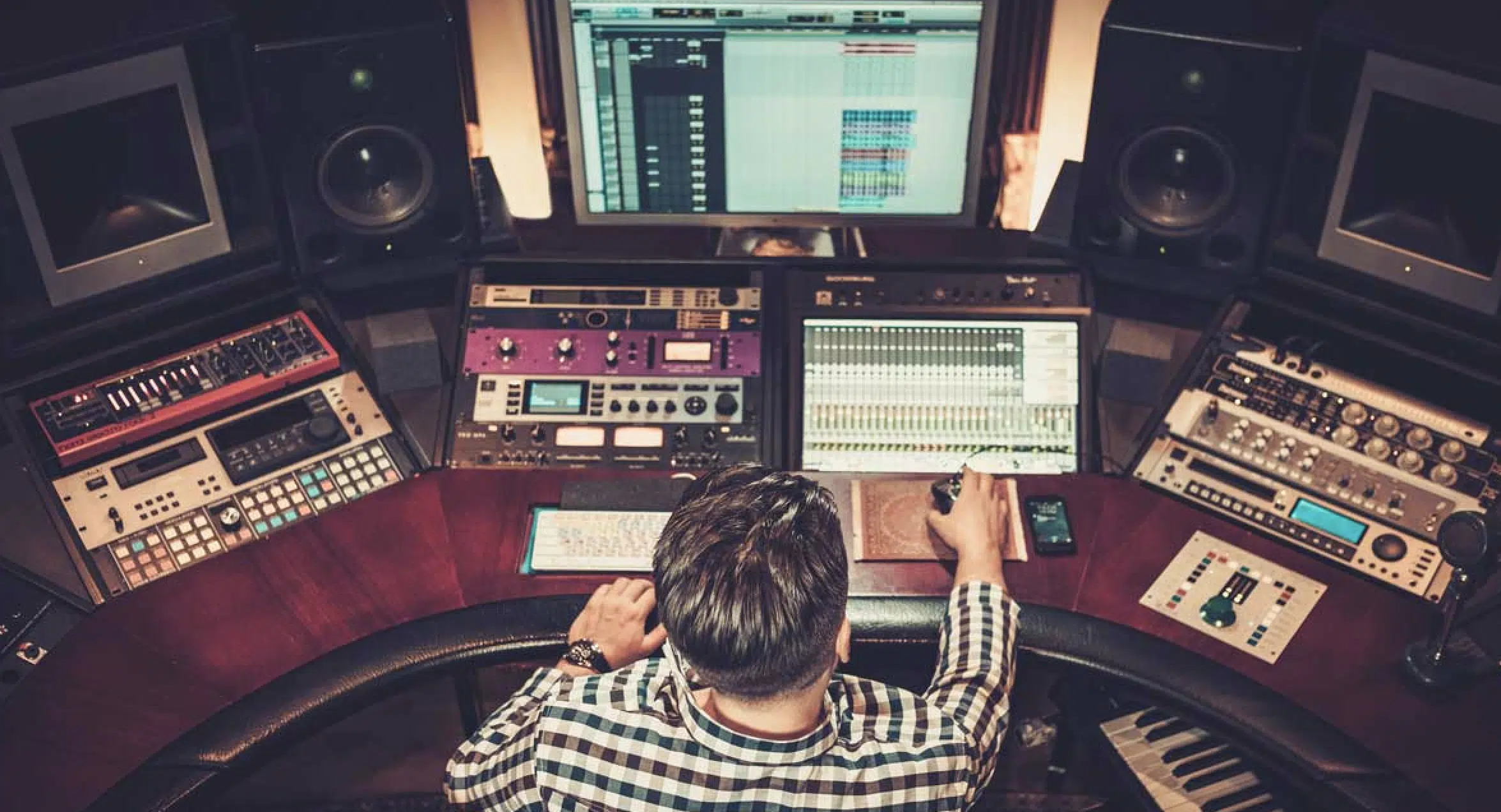
The evolution of digital audio has revolutionized the landscape of music production and audio engineering.
It empowers music producers/audio producers to craft, tweak, and perfect sounds with an accuracy that was previously unimaginable.
In essence, digital audio represents sound signals in a digital format.
It captures the nuances, emotions, and atmospheres that the human ear cherishes 一 translating them into binary data that computers can manipulate.
These technical aspects have made it possible to preserve the purity of sounds without the degradation that analog systems often encounter over time.
The allure of producing and audio engineering in the digital domain lies in its flexibility.
For example, you can easily:
- Manipulate pitches
- Time-stretch
- Layering sound effects
- Experiment with soundscapes
Audio producers can bring to life symphonies without touching a physical instrument.
Or, they can blend organic recordings with synthesized elements to create hybrid masterpieces that truly shine.
In the age of digital audio, the sonic canvas is vast and waiting to be painted by you and your audio production work.
-
Importance of Choosing the Right DAW
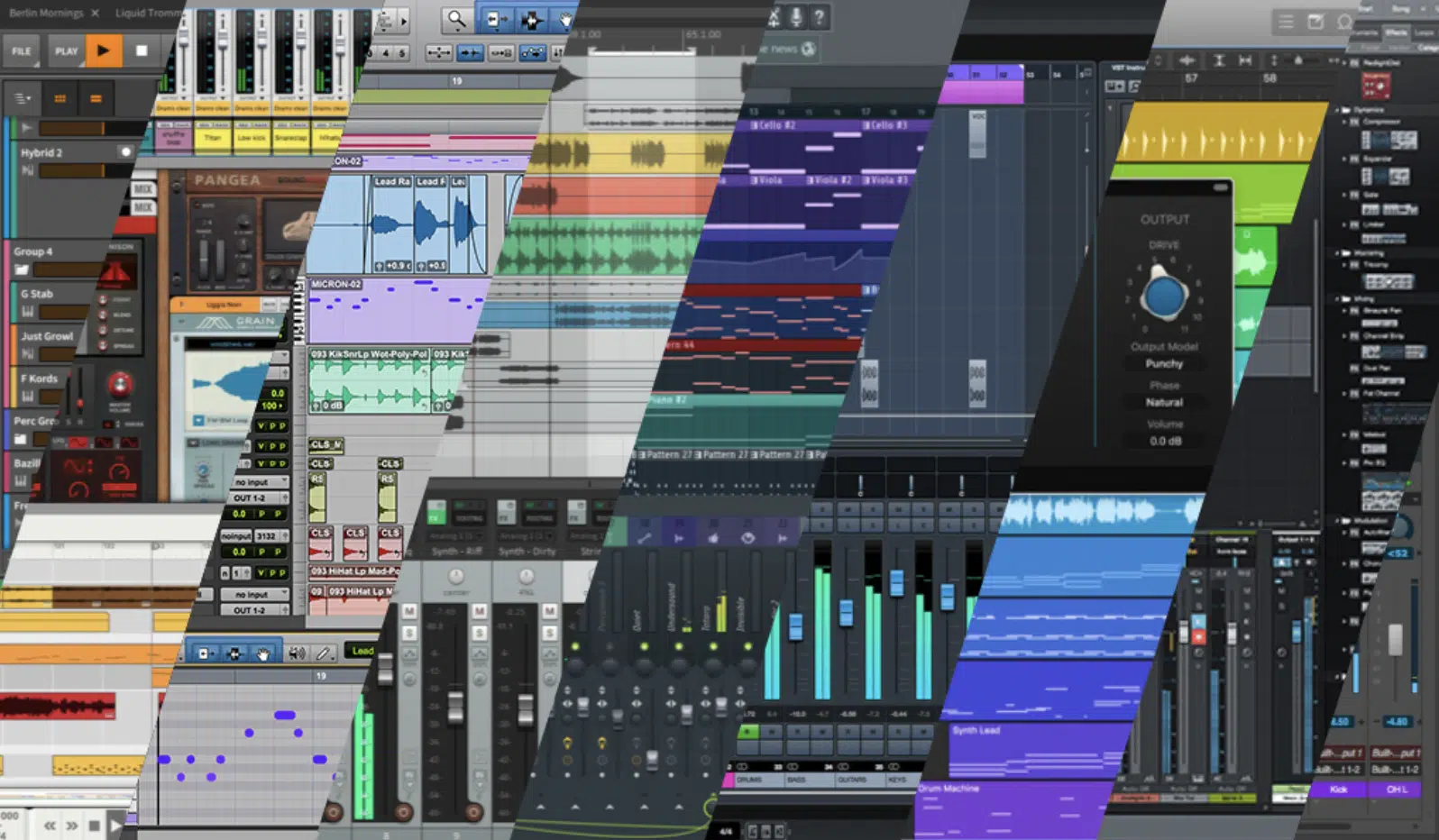
At the heart of every modern music production setup is the Digital Audio Workstation (DAW).
This powerful audio software acts as a producer’s playground, workshop, and laboratory, all in one.
Choosing the right DAW isn’t just a matter of preference; it can drastically influence the workflow, output, and even the creative boundaries of your workflow.
Different DAWs cater to different needs and your creative process.
While some excel in MIDI sequencing and electronic music production, others might be tailored for live recordings or film scoring.
Certain factors can vary significantly across different platforms, like:
- The included plug ins
- The user interface
- Processing capabilities
- Integration with your external gear
A well-chosen DAW will perfectly complement how you produce your own music, streamlining the audio production process.
It will enhance your music production flow 一 allowing you to translate ideas into tracks swiftly and efficiently.
Investing time in understanding and selecting the right digital audio workstation like a guitarist finding their perfect instrument…
It resonates and feels right (plus, it elevates your music production skills, which is critical).
-
Pro Tools & Ableton Live: Audio Engineering Must-Haves
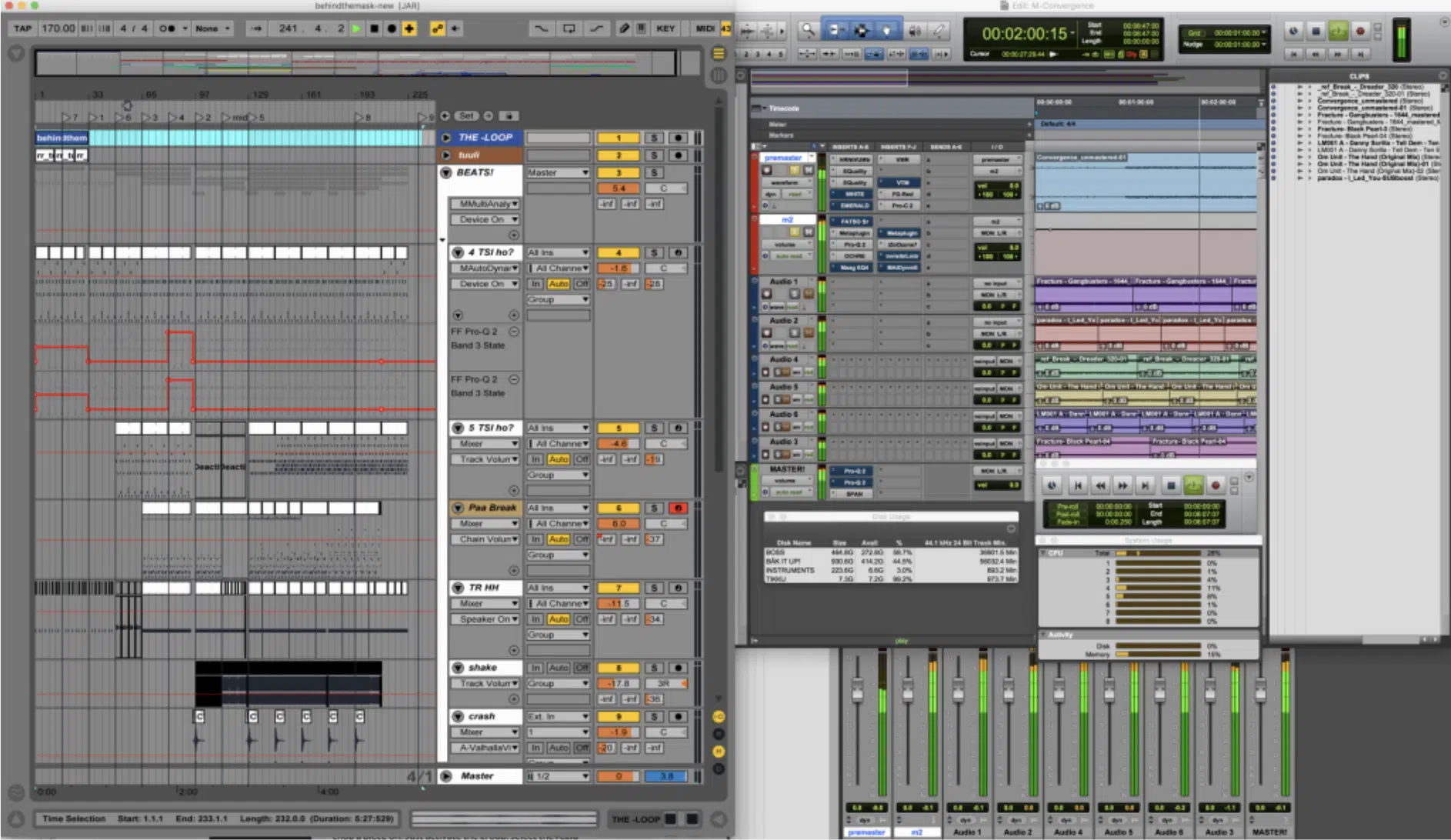
When it comes to industry standard tools in music production, two names often rise to the top:
These heavyweight DAWs have carved niches for themselves that will always resonate.
Each offers a unique suite of tools and features that cater to audio production professionals worldwide.
Pro Tools, often hailed as the “industry’s leading digital audio workstation,” has been a staple in professional recording studios and sound production circles for decades.
Its robust audio recording and editing capabilities make it a favorite among sound engineers and music producers who prioritize precision.
Pro Tool’s seamless integration with high-end studio gear, combined with its unparalleled mixing and mastering features, has solidified its reputation in top-tier music, film, and television productions.
Ableton Live has etched its legacy as a game-changer in electronic music production and live performances.
Its intuitive clip-based sequencing, vast array of plug ins, and real-time manipulation capabilities have made it a go-to for music producers in various genres.
Ableton’s unique session view enables audio producers and DJs to trigger clips non-linearly.
NOTE: This makes live remixing and improvisation a seamless experience.
Pro Tools and Ableton Live come with their learning curves.
Still, the capabilities these industry standards provide make the journey worthwhile for aspiring music producers.
Essentials of Audio Recording
When it comes to the backbone of music production, audio recording stands tall. From capturing raw talent to tweaking minute details, the journey is intricate and rewarding.
So, let’s get right into how you can dominate any recording session you’re a part of.
-
The Importance of Quality Audio Recording
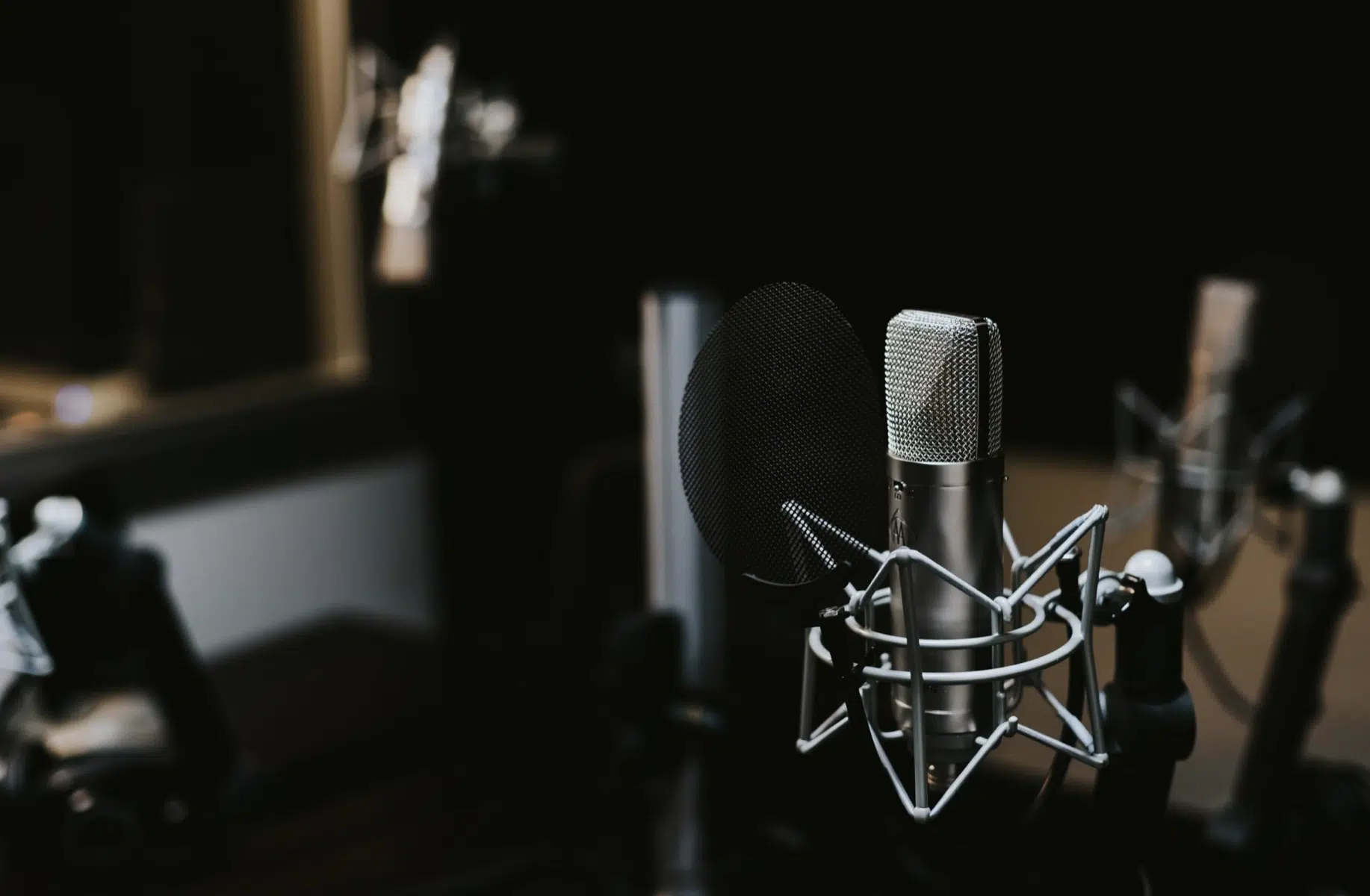
At the heart of every great song is a pristine audio recording.
If the audio recording is subpar, even the best mixing and mastering in the best recording studio won’t save it.
Think about it this way…
If you’re building a house, the final audio recording is the foundation; it has to be solid.
Music producers (like yourself) music understand the importance of this solid foundation in terms of capturing each sound with clarity.
When that snare hits, the drums pump, or the bass drops, you want listeners to feel it in their bones.
Modern hip-hop and trap have evolved tremendously over the years.
For instance, Travis Scott, Cardi B, and J. Cole utilize various sound textures in their music 一 including various sounds from crystal clear vocals to distorted 808s.
If any element of the track were poorly recorded, it would significantly impact the final audio product, including all the instruments and audio effects.
When you have a clear audio recording, you spend less time in the post-production phase trying to “fix” issues.
Noise interference, audio clipping, or even a muffled recording can lead to hours of audio editing work.
Ensuring the sound is captured accurately helps an audio engineer streamline the entire audio production process.
-
The Recording Process: Breaking it Down
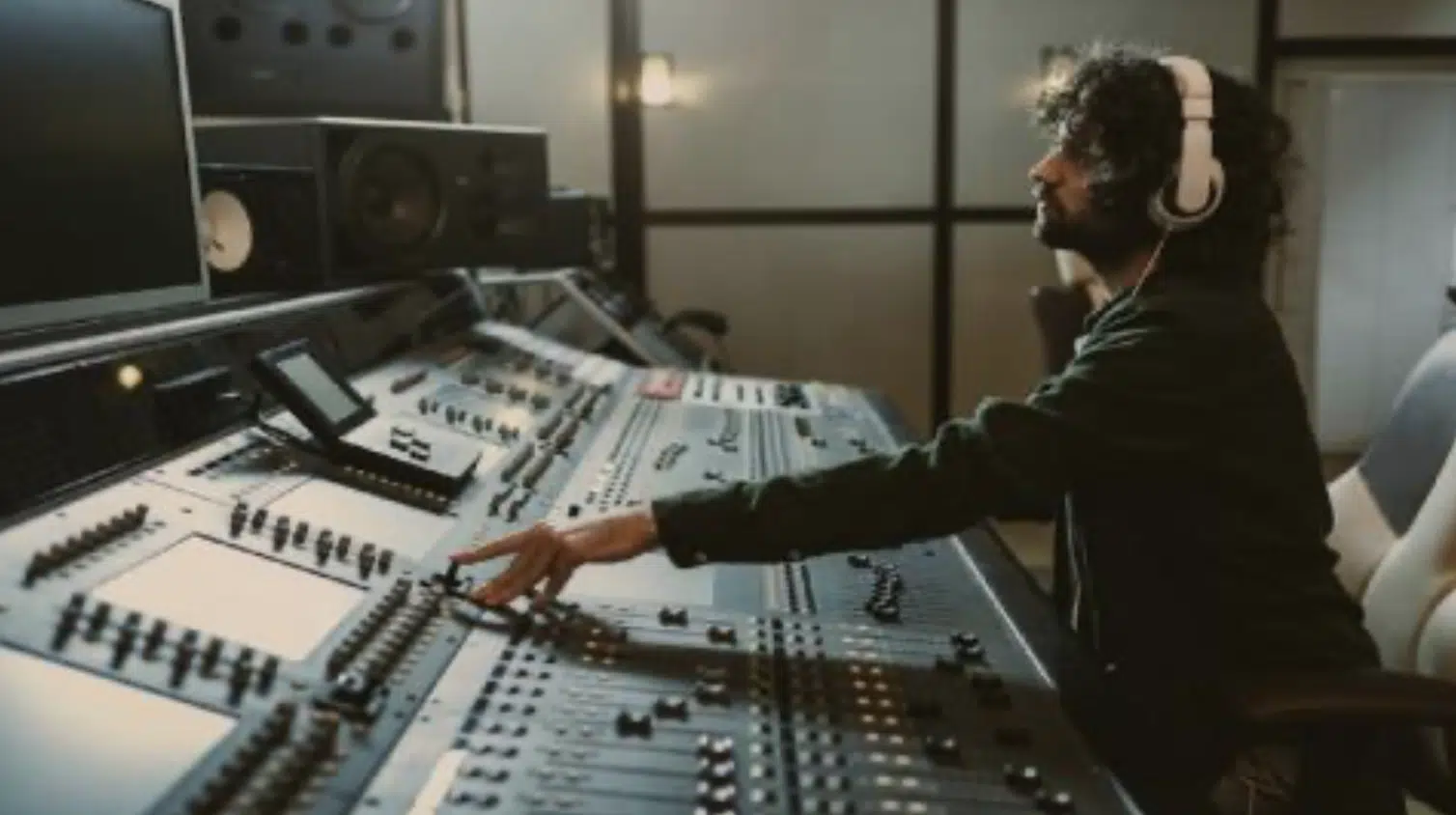
Next, let’s examine how professional audio engineers navigate the intricate (and exciting) world of sound recording in depth.
To begin, the heart of any music studio is its recording equipment.
Recording equipment includes everything from high-end microphones that capture every nuance of live sound to headphones for analyzation (critical when you’re learning audio production).
Central to this gear ensemble is the recording console; filled with knobs, faders, and buttons to further polish your sounds.
Your recording console serves as the hub where all the audio signals converge and are shaped before being recorded.
The importance of audio engineers cannot be understated when it comes to the creative process of sound recording and music composition as a whole.
An audio engineer sets up the recording equipment, ensuring the instruments and vocals are captured flawlessly.
Plus, an audio engineer can turn a sloppy, unmixed recording into a true spectacle that shines with clarity.
But their role doesn’t end there…
Once the essential tracks are down, audio engineers use their expertise to:
- Tweak
- Balance
- Perfect each recording
This will ensure an album sounds coherent and their audio production work shines through.
Another layer to the process is the ambiance of the recording studio itself.
The design of your recording studio (including its acoustics and isolation booths) plays a significant role in ensuring a pristine capture of live sound.
This controlled environment minimizes external noises 一 creating a blank canvas for musicians and artists to paint their auditory masterpieces.
Every recording session, whether in your home studio or a professional recording studio, is a symphony of multiple components coming together.
And when executed with precision, the result is a sound recording that stands the test of time.
Diving Deep into Mixing and Mastering
Mixing and mastering is like sculpting; you take a chunk of raw materials (various sounds) and refine them until they’re flawless.
In audio production, the way you mix music and master the final mix is make-or-break, so let’s dive in.
-
The Magic Behind Mixing and Mastering
Mixing and mastering is where the actual audio production magic happens.
It helps you go from a solid foundation to a brilliant piece of audio production work.
#1. Mixing
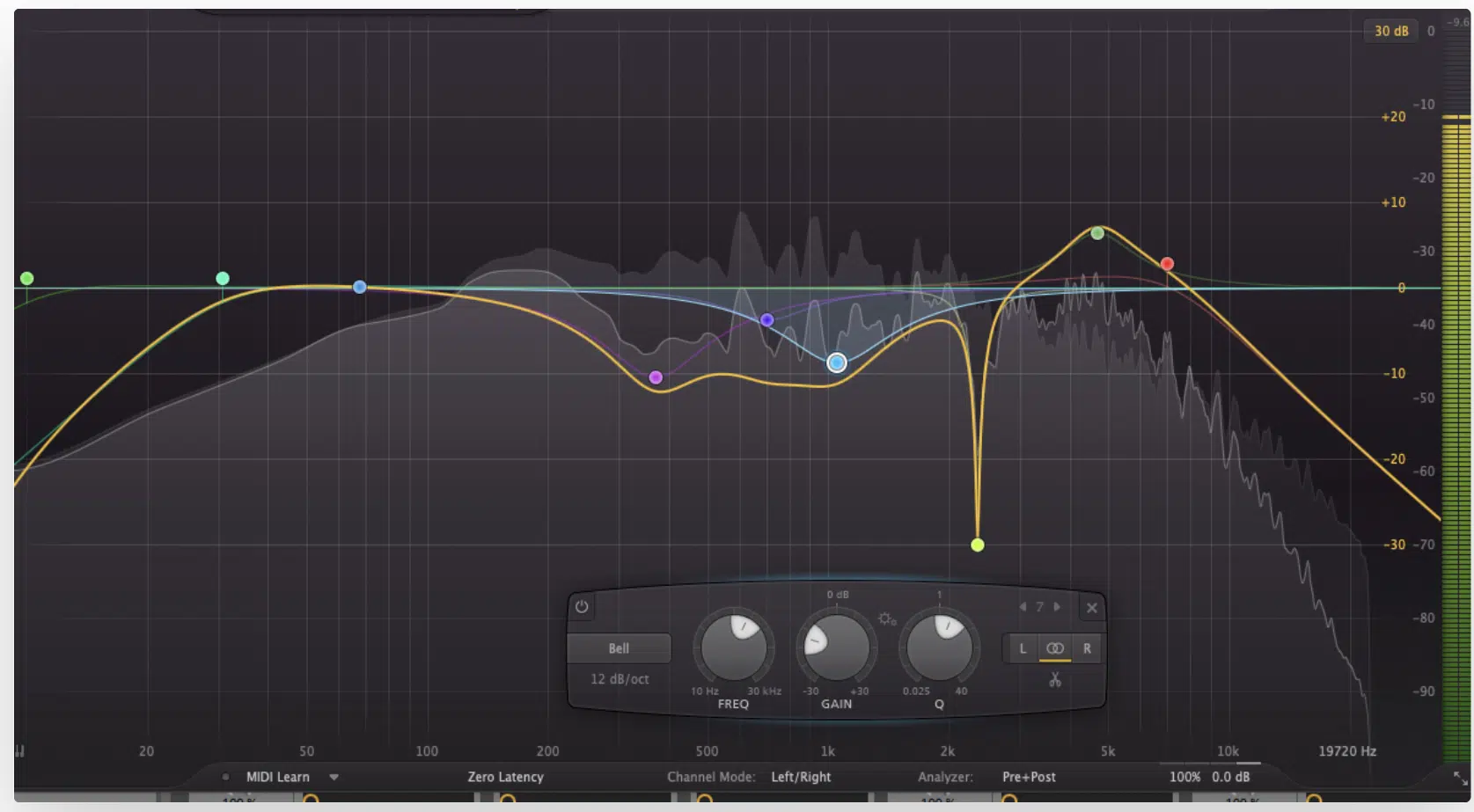
Mixing is about balancing all the different elements in a track.
It ensures that each instrument, vocal, or sound effect sits perfectly in the mix by:
- Taking that kick drum and making it slap
- Making sure the 808 bass thunders through
- Placing those hi-hats so they sparkle just right
Ever heard a track where the vocals seem to ‘float’ on top? 一 That’s excellent mixing.
Audio production titans like Metro Boomin and Southside have an uncanny ability to craft tracks where everything, from the trap snares to the ad-libs, has its place.
Once you sharpen your mixing skills at your own pace (like a mixing engineer), you, too, can create legendary tracks for the world.
If you’d like to learn all about what mixing engineers do, we’ve got you covered.
NOTE: When you hear the term ‘mixing console,’ it simply refers to your DAW interface since we’re in the digital age.
A mixing console helps you, or any mix engineer, adjust levels, pan, and add sound effects like a true boss.
#2. Mastering
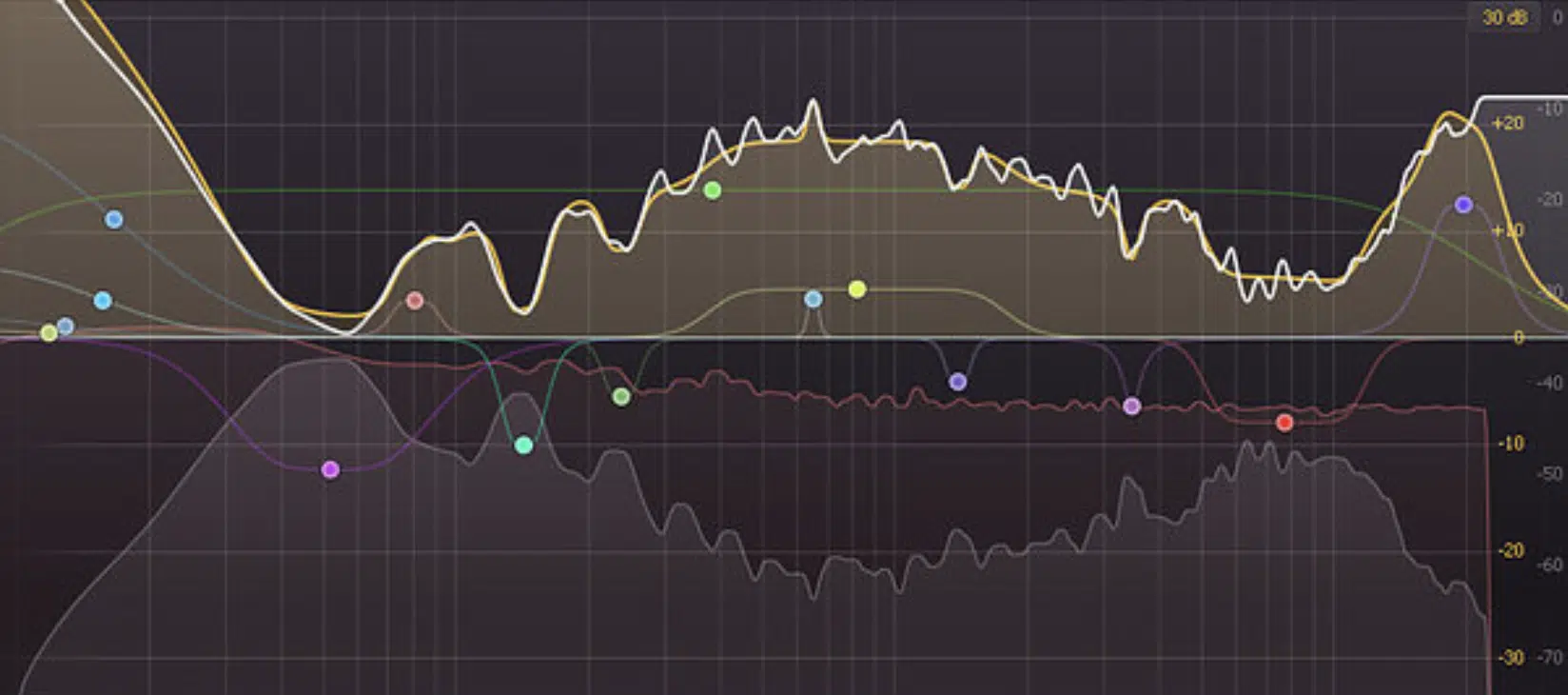
Mastering, on the other hand, is the final post-production polish.
It ensures your track sounds consistent on every sound system, like club speakers or smartphone earbuds.
It’s that extra sauce that gives tracks the commercial shine you hear on tracks by music production experts like Murda Beatz.
Just remember mastering cannot fix problems in the mix, so make sure your final audio mix is pristine before proceeding to the post-production stage.
-
Mastering Engineers & Their Role in the Audio Production Process
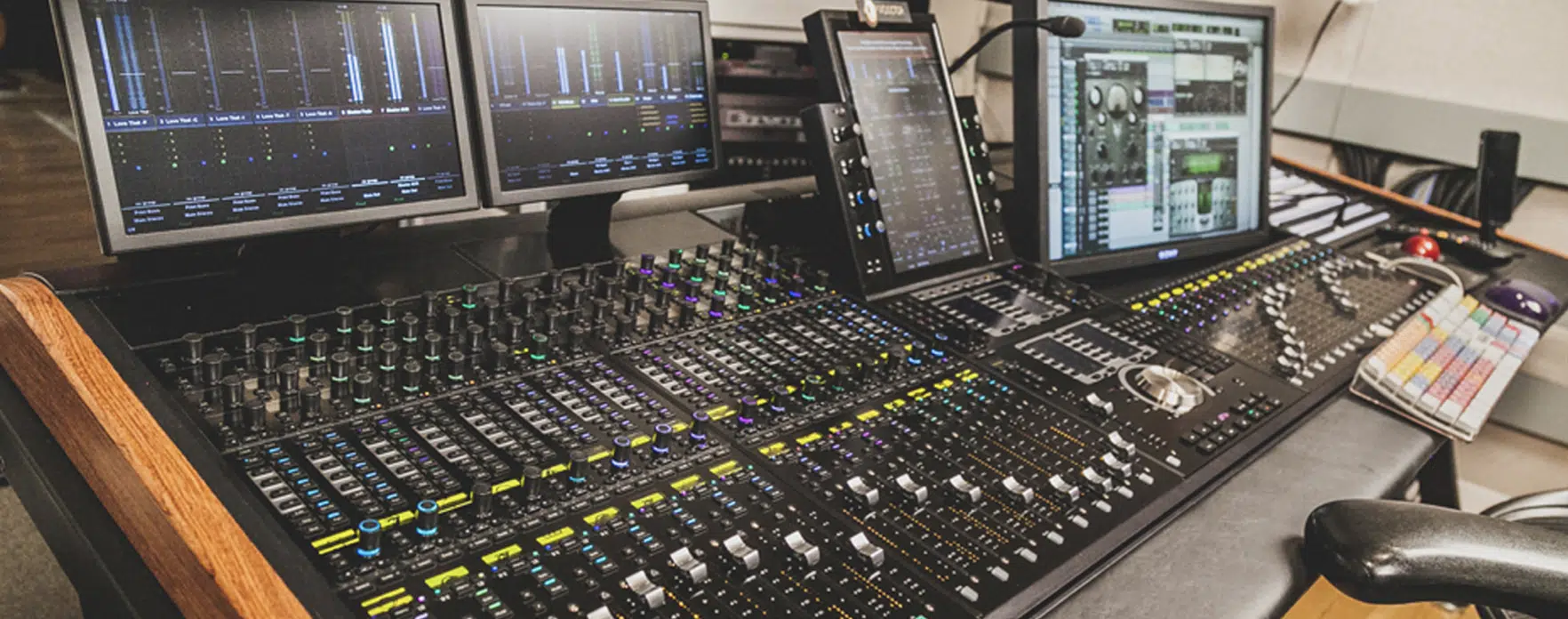
Once a track is mixed, it’s off to the mastering engineer; unless you’re mastering your own music, of course.
They ensure the final product sounds balanced, full, and loud enough to compete in today’s saturated audio production world.
With the rise of audio production streaming, mastering has additional considerations.
Sound production platforms like Spotify and Apple Music have specific loudness standards.
Using tools like LUFS meters, mastering engineers (or you) can ensure tracks meet these standards without sacrificing punch.
Music production icons like Mike Dean, known for his work with Kanye West and Kid Cudi, have mastered tracks that sound incredible on streaming platforms and vinyl.
It’s a delicate balance, but one that can significantly elevate a track’s quality.
A few mastering tips are:
- Ear training with a reference track
- High-pass filtering
- Test your track out on multiple playback systems
- Stay updated with the latest plug ins, techniques, and trends
An example of one of the most renowned audio production techniques is limiting, which boosts the overall volume, ensuring peaks don’t cause distortion.
But overdo it, and your final audio can sound squashed 一 the key is subtlety.
If you’d like to learn everything about mastering engineers, we’ve got you covered.
How To Create Captivating Beats
As the heart and soul of a track, crafting that perfect beat is a blend of creativity, technique, and an audio engineer ear for detail.
Here, we will break down the techniques, tools, and tricks that make a beat truly come alive.
-
Sound Design Essentials Every Audio Engineer Should Know
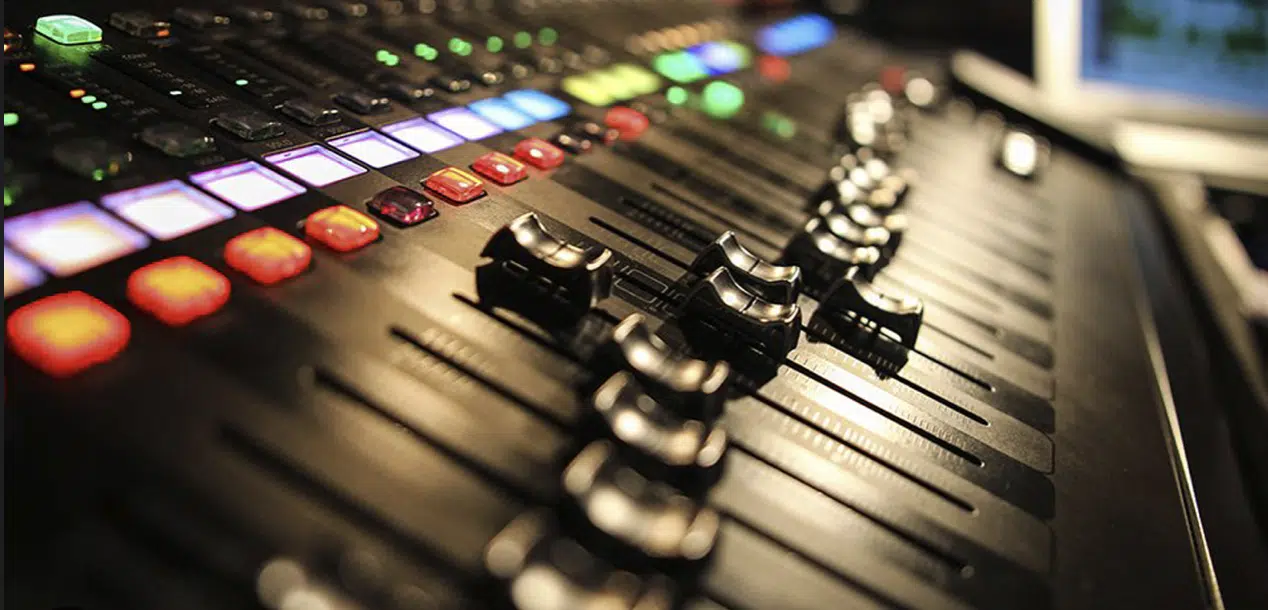
Every sound you hear, from the rumble of an 808 bass to the sizzle of a hi-hat in your own music, has its roots in waveforms.
Familiarizing yourself with sine, square, sawtooth, and triangle waves, for instance, can open up a world of sound design possibilities.
Sampling has also been a cornerstone of hip-hop since its inception.
Modern beat-makers, drawing inspiration from legends like J Dilla or Metro Boomin, know the art of breathing life into various sounds (pre-existing).
But there’s more to beat-making than just straight-up sampling; there’s also granular synthesis.
This audio production technique is about breaking down samples into microscopic grains and manipulating them.
It results in ambient textures or entirely new sounds.
But, creating an impactful beat as an audio engineer isn’t just about choosing the right sounds; it’s about layering and texturing.
It’s the art of taking a simple drum pattern and transforming it into something complex and ear-catching.
Particular dynamics processing can transform a beat from mundane to mesmerizing, like:
- Layering different snare sounds
- Adding a touch of reverb
- Panning elements across the stereo field
And then there’s sound modulation 一 those shifting, evolving sounds that keep a listener hooked and an audio engineer famous.
It’s about making specific parameters (filter sweeps, pitch bends, and LFO modulations) come alive and breathe new life into a static sound.
If you’re striving to be a professional audio engineer, sound design will be your hero.
Speaking of sound design, if you’re looking for the most game-changing sound design secrets, don’t miss out!
-
Utilizing Sound Effects to Enhance Your Beats
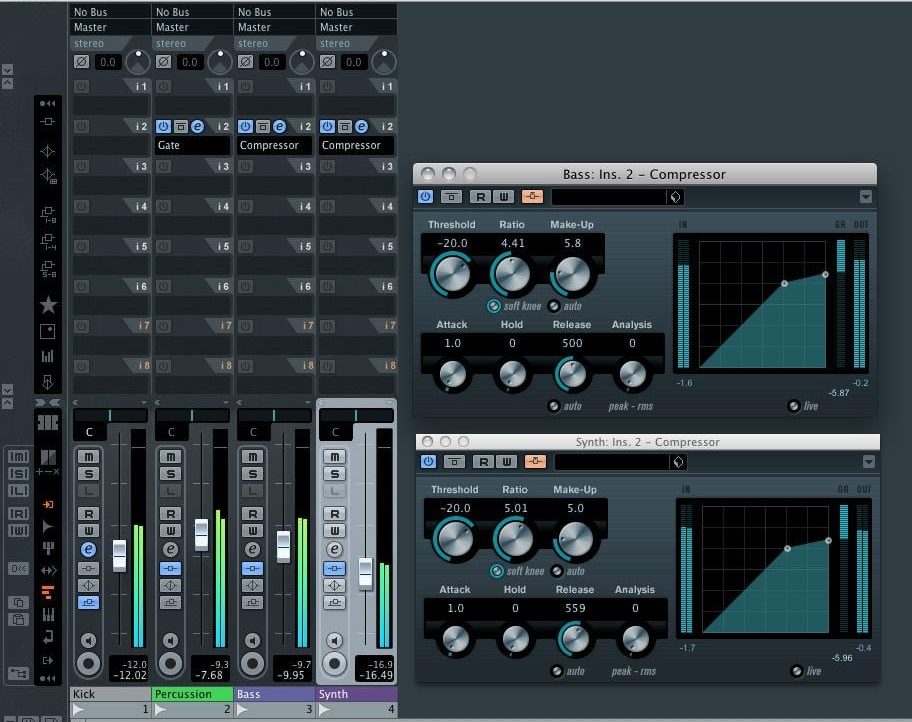
Reverb and delay aren’t just effects; they’re tools to carve out space and depth in a mix.
Any audio production master, which you’re aiming to be, knows the impact that audio effects can bring to the table.
For example, if you want a haunting, atmospheric vibe, a deep reverb might be your go-to, or if you’re looking for that old-school echo, a slap-back delay can work wonders.
But, it’s not just about space… Sometimes, it’s about adding character.
A bit of distortion on an 808 can make it hit way harder and stand out in a mix.
Saturation can add warmth/fatness and help an EP or album sound coherent 一 transforming a weak, underwhelming sound into something powerful and resonant.
While adding is great, sculpting various sounds is just as crucial, and this is where filters and EQs come into play.
Audio effects like filters and EQs can help you:
- Carve out frequencies
- Ensure clarity
- Prevent muddiness
As an audio engineer, fine-tuning ensures that every sound sits perfectly in the mix and that all the songs you have a hand in make a lasting impact on your listeners.
Time-stretching and pitch-shifting are more tools in the beat-maker’s toolkit.
They offer a way to reshape and repurpose sounds in creative ways.
Slowing down a sample or pitching it up can evoke entirely different emotions, serving as the difference between a somber mood and an upbeat vibe.
Audio Production: Final Thoughts
Audio production and engineering are more than just technical processes; they’re the beating heart that transforms raw sound into a polished musical masterpiece.
Understanding the nuances and techniques of audio production is essential not only to produce quality music but to truly bring a creative vision to life.
Having delved deep into the realms of sound design, mixing, mastering, you’re now equipped with the knowledge to dive headfirst into the world of audio production.
But as you venture forth, remember: knowledge is only half the equation.
Equally important are the tools you equip yourself with.
Speaking of invaluable tools, if you want to jumpstart your audio production journey with a competitive edge, the Free Dark Hip-Hop Sample Pack is your go-to resource.
It contains 60 free hip-hop sample, loops, and MIDI files to give your beats that dark, moody edge.
They’re mirrored off of chart-toppers like Drake, 21 Savage, and Young Thug, so you already know they’ll help your music capture attention and captivate audiences.
What sets this mind-blowing pack apart is its originality 一 these aren’t just random samples.
They’re expertly curated by seasoned beatmakers, sound designers, and audio engineers to ensure that your tracks don’t just sound good, but feel professionally produced and placement-ready.
So, armed with your newfound knowledge and the right set of tools, it’s time to channel your creativity.
As well as play around with those dark hip-hop samples and start producing tracks that resonate, captivate, and leave a mark.
The world of audio production awaits, and with dedication and passion, you’re all set to make waves.
Until next time…







Leave a Reply
You must belogged in to post a comment.